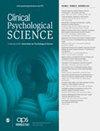减轻压力的心理中介:基于智能手机的幸福感培训随机对照试验的预先登记分析
IF 4.1
2区 医学
Q1 PSYCHIATRY
引用次数: 0
摘要
了解干预措施发挥作用的原因对于优化干预措施至关重要。虽然存在基于冥想的干预(MBI)的机理理论,但经验证据却很有限。在 COVID-19 大流行的早期,我们将 662 名成年人(79.9% 的人报告有临床水平的焦虑或抑郁症状)随机分配到为期 4 周的基于智能手机的 MBI 或等待对照组中。在干预期间和 3 个月的随访中,对心理困扰和四种理论驱动的幸福感心理中介(正念行动、孤独感、认知化解和目的)进行了五次评估。在预先登记的分析中,干预的分配预示着所有中介因子的显著提高,而这些中介因子反过来又对后续的困扰有显著的中介作用(干预对困扰影响的 21.9%-62.5% )。在探索性的多重中介分析中,没有观察到明显的中介途径,但孤独感的减少占了综合间接效应的61.7%。在数字 MBI 中,多种心理途径都可能对减轻困扰起到中介作用。本文章由计算机程序翻译,如有差异,请以英文原文为准。
Psychological Mediators of Reduced Distress: Preregistered Analyses From a Randomized Controlled Trial of a Smartphone-Based Well-Being Training
Understanding why interventions work is essential to optimizing them. Although mechanistic theories of meditation-based interventions (MBIs) exist, empirical evidence is limited. We randomly assigned 662 adults (79.9% reported clinical levels of anxiety or depressive symptoms) to a 4-week smartphone-based MBI or wait-list control condition early in the COVID-19 pandemic. Psychological distress and four theory-driven preregistered psychological mediators of well-being (mindful action, loneliness, cognitive defusion, and purpose) were assessed five times during the intervention period and at 3-month follow-up. In preregistered analyses, assignment to the intervention predicted significant gains on all mediators, which, in turn, significantly mediated follow-up distress (21.9%–62.5% of intervention effect on distress). No significant mediation pathway was observed in an exploratory multiple mediator analysis, but reduced loneliness accounted for 61.7% of the combined indirect effect. Multiple psychological pathways may mediate reduced distress in a digital MBI.
求助全文
通过发布文献求助,成功后即可免费获取论文全文。
去求助
来源期刊

Clinical Psychological Science
Psychology-Clinical Psychology
CiteScore
9.70
自引率
2.10%
发文量
35
期刊介绍:
The Association for Psychological Science’s journal, Clinical Psychological Science, emerges from this confluence to provide readers with the best, most innovative research in clinical psychological science, giving researchers of all stripes a home for their work and a place in which to communicate with a broad audience of both clinical and other scientists.
 求助内容:
求助内容: 应助结果提醒方式:
应助结果提醒方式:


